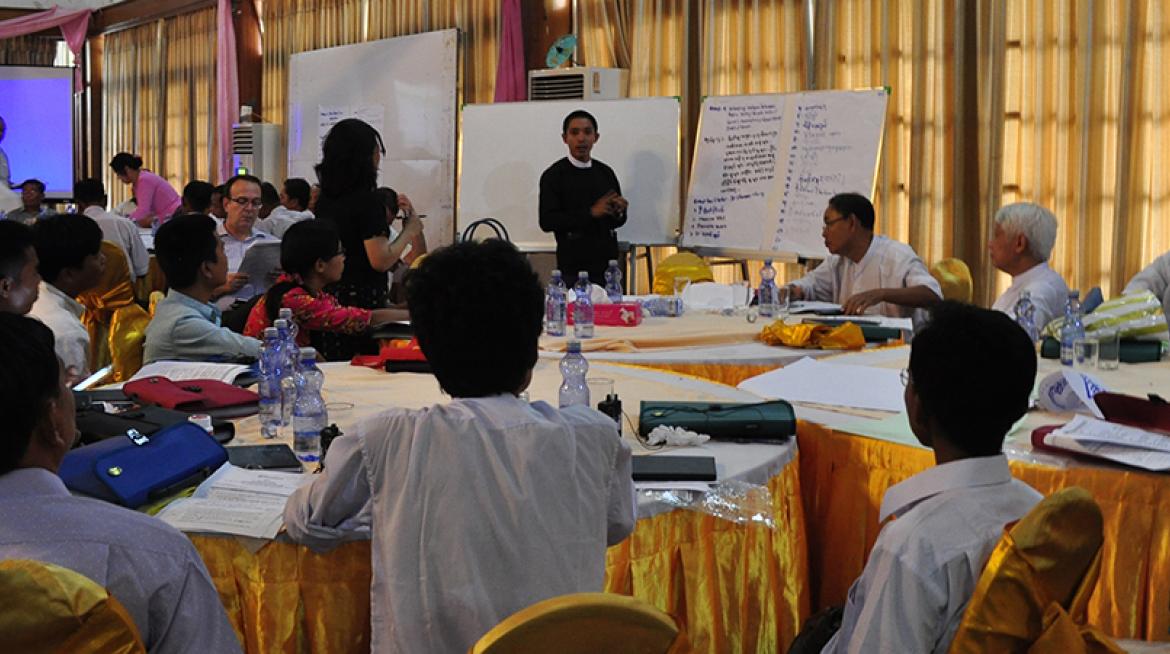
PATHEIN, May 2017| Rice plays an important role in Myanmar’s economy and the Ayeyarwady Region is a key area for rice production. The delta region produces rice grown during the monsoon and summer, and accounts for one-third of the country’s total rice cultivation (approximately 5 million acres), according to the Department of Agriculture.
A roundtable meeting titled Rice sector in the lower delta: creating a more enabling sustainable environment was held in Pathein on May 16 and 17 to discuss the development of the region’s rice sector. More than 130 participants representing government, NGOs, traders, millers, input suppliers, researchers and farmer groups from nine townships of the lower delta region attended and participated.
Maurice Schill, LIFT Programme Coordinator said: “It is not just a simple value chain. The rice belongs to the culture and it is more than food and income. We need to go forward with a holistic approach to find out how to integrate rice into our economy and culture. Challenges should be addressed in a communicative and coordinated way – whether to look at research and innovation, post-harvest management, or others”.
Francesco Goletti , Agrifood Consultation International (ACI), who conducted technical research on Myanmar’s rice economy for the World Bank, gave a keynote presentation at the event.
He said: “Myanmar has a low unit of export rice compared to other countries in the region. Rice exports are feasible, but not necessarily the most attractive option. An increase in competitiveness, based on higher quality and higher productivity, will make rice exports more attractive.”
LIFT’s implementing partner Mercy Corps organised the event under its LIFT-funded project Linking Labutta to Markets (LLM) Increasing Incomes through Agriculture, Skills, and Employment. The project is facilitating collaboration and coordination between different players in the rice value chain. “We all have a role to play with different experience, perspective, knowledge to work more collectively [to achieve the development in the rice value chain]”, said Leo Roozendaal, Country Director of Mercy Corps Myanmar.
The round table meeting was the first of its kind in the region. The main objectives were to reach consensus on the key areas to work on for change so that the business environment of the rice sector is more enabling; and to outline key actions for implementation. The two-day meeting included a panel discussion facilitated by U Moe Aung. The panelists U Aung Than Oo, Chairman, Rice Trader Association, Labutta; U Hla Aye, rice farmers’ representative; U Thant Lwin, miller, and U Sein Maung Myint, DOA District Officer, Pathein shared their experiences, practices and challenges. After the panel discussion group work began on five topics: research and innovation; access to inputs; the main roles of key stakeholders; enhancing dialogue between public sector/private sector/farmers’ associations/researchers/INGOs/donors, and climate change and the environment.
In his closing remarks, Ayeyarwady Region’s Minister for Agriculture, Livestock, Natural Resources and Environmental Conservation H. E U Ba Hein, said he appreciated the initiative because the event clearly highlighted the needs and issues on the ground for rice value chain development. He said he was confident of good outcomes from the event because of the strong collaboration among stakeholders.
At the end of the workshop, volunteers representing traders, millers and farmers agreed to participate in further discussions of the rice value chain development, guided by Mercy Corps and technical experts. The workshop’s outputs will be consolidated in a comprehensive report and shared with the stakeholders who will discuss the recommendations and the way forward.


